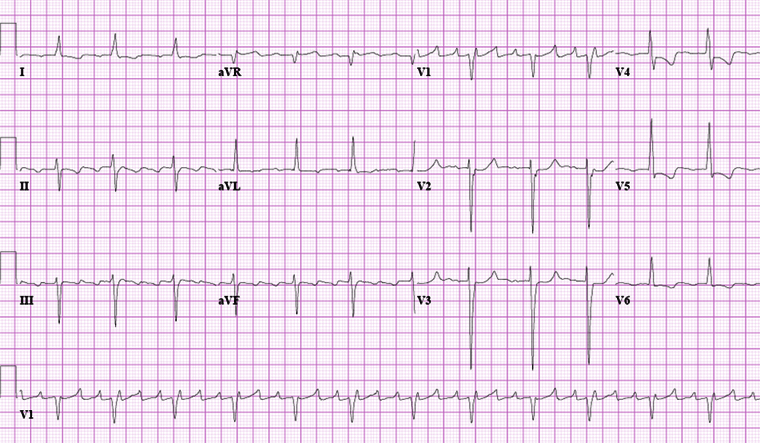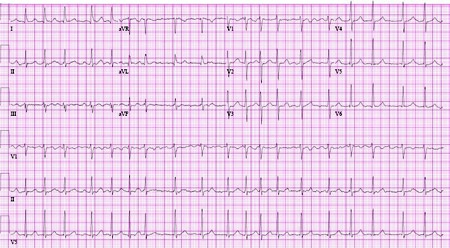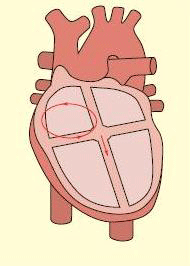შეჯამება
განსაზღვრება
ანამნეზი და გასინჯვა
ძირითადი დიაგნოსტიკური ფაქტორები
- worsening heart failure or pulmonary symptoms
- jugular venous pulsations with rapid flutter waves
სხვა დიაგნოსტიკური ფაქტორები
- palpitations
- fatigue or lightheadedness
- chest pain
- dyspnea
- syncope
- hypotension
- embolic events
რისკფაქტორები
- increasing age
- valvular dysfunction
- atrial septal defects
- atrial dilation
- recent cardiac or thoracic procedures
- surgical or postablation scarring of atria
- heart failure
- hyperthyroidism
- COPD
- asthma
- pneumonia
- antiarrhythmic drugs for atrial fibrillation
- diabetes
- digitalis use
- male sex
- congenital or lone atrial flutter
დიაგნოსტიკური კვლევები
1-ად შესაკვეთი გამოკვლევები
- ECG
- thyroid function tests
- serum electrolytes
Tests to avoid
- imaging stress tests
- coronary CT angiography
გასათვალისწინებელი კვლევები
- pulmonary function tests
- CXR
- digitalis level
- cardiac enzymes
- spiral CT with pulmonary embolism protocol
- transthoracic echocardiogram
- atrial electrogram recording
- electrophysiologic studies
მკურნალობის ალგორითმი
hemodynamically unstable
hemodynamically stable
recurrent atrial flutter or failure of elective cardioversion
კონტრიბუტორები
ავტორები
Katherine C. Wu, MD, FACC
Associate Professor of Medicine
Johns Hopkins University
School of Medicine
Baltimore
MD
გაფრთხილება:
KCW declares that she has no competing interests.
რეცენზენტები
Richard C. Wu, MD
Associate Professor of Medicine
Director
Cardiac Electrophysiology Laboratory
UT Southwestern Medical Center
University Hospital
St. Paul
Dallas
TX
გაფრთხილება:
RCW declares that he has no competing interests.
Reginald Ho, MD
Clinical Assistant Professor
Department of Medicine
Thomas Jefferson University Hospital
Philadelphia
PA
გაფრთხილება:
RH declares that he has no competing interests.
George Juang, MD, FACC
Director of Electrophysiology
Long Island Arrhythmia Center
Mineola
NY
გაფრთხილება:
GJ declares that he has no competing interests.
წყაროები
ძირითადი სტატიები
Page RL, Joglar JA, Caldwell MA, et al. 2015 ACC/AHA/HRS guideline for the management of adult patients with supraventricular tachycardia. J Am Coll Cardiol. 2016 Apr 5;67(13):e27-115.სრული ტექსტი აბსტრაქტი
Hindricks G, Potpara T, Dagres N, et al. ESC Scientific Document Group. 2020 ESC guidelines for the diagnosis and management of atrial fibrillation developed in collaboration with the European Association for Cardio-Thoracic Surgery (EACTS): the Task Force for the diagnosis and management of atrial fibrillation of the European Society of Cardiology (ESC) developed with the special contribution of the European Heart Rhythm Association (EHRA) of the ESC. Eur Heart J. 2021 Feb 1;42(5):373-498.სრული ტექსტი აბსტრაქტი
Joglar JA, Chung MK, Armbruster AL, et al. 2023 ACC/AHA/ACCP/HRS guideline for the diagnosis and management of atrial fibrillation: a report of the American College of Cardiology/American Heart Association Joint Committee on clinical practice guidelines. Circulation. 2024 Jan 2;149(1):e1-156.სრული ტექსტი აბსტრაქტი
გამოყენებული სტატიები
ამ თემაში მოხსენიებული წყაროების სრული სია ხელმისაწვდომია მომხმარებლებისთვის, რომლებსაც აქვთ წვდომა BMJ Best Practice-ის ყველა ნაწილზე.

დიფერენციული დიაგნოზები
- Atrial fibrillation
- Atrial tachycardia
მეტი დიფერენციული დიაგნოზებიგაიდლაინები
- 2023 ACC/AHA/ACCP/HRS guideline for the diagnosis and management of atrial fibrillation: a report of the American College of Cardiology/American Heart Association Joint Committee on clinical practice guidelines
- 2020 ESC guidelines for the diagnosis and management of atrial fibrillation
მეტი გაიდლაინებიპაციენტის ბროშურები
Atrial fibrillation: what is it?
Atrial fibrillation: what treatments work?
მეტი პაციენტის ბროშურებიკალკულატორები
Atrial Fibrillation CHA(2)DS(2)-VASc Score for Stroke Risk
HAS-BLED Bleeding Risk Score
მეტი კალკულატორებიVideos
Electrical (direct current) cardioversion animated demonstration
მეტი ვიდეოებიშედით სისტემაში ან გამოიწერეთ BMJ Best Practice
ამ მასალის გამოყენება ექვემდებარება ჩვენს განცხადებას

